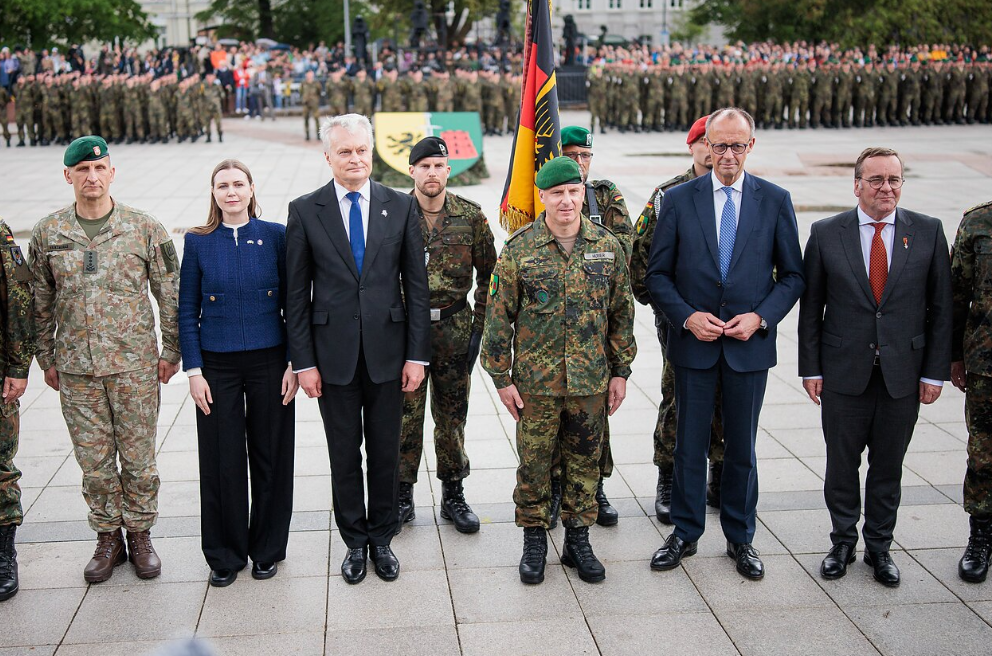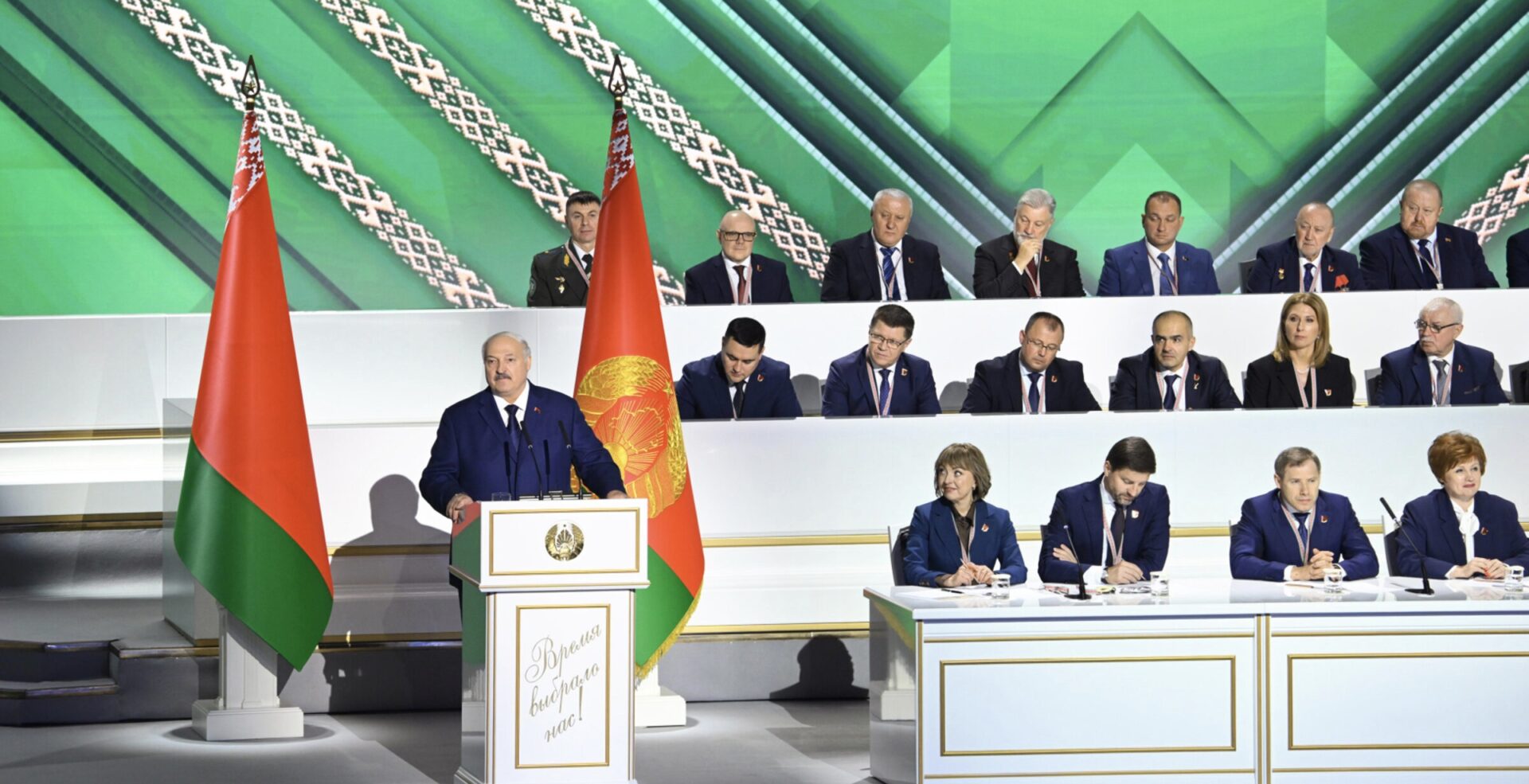
Lithuania Welcomes German Brigade
Lithuania Welcomes German Brigade
Executive Summary:
- The German Panzerbrigade 45 (Armored Brigade 45) was officially inaugurated in Lithuania on May 22, marking a step towards the permanent deployment of 5,000 German military personnel on NATO’s frontline by 2027.
- Roughly 3,200 foreign NATO troops—mainly the German-led Enhanced Forward Presence battlegroup, two U.S. armored battalions, and the initial German brigade element – are currently stationed in Lithuania.
- Even with German Chancellor Friedrich Merz’s pledge that Lithuania can “count on Germany,” Baltic defense planning still rests on a U.S. military presence and rapid response in case of Russian aggression.
On May 22, Lithuanians cheered as German tanks drove through the streets of Vilnius, the capital once occupied by Nazi Germany. City buses flashed messages praising German and Lithuanian fraternal ties. Without any apparent signs of historical unease, one thousand Lithuanian and German soldiers lined Vilnius’s Cathedral Square to inaugurate the German Panzerbrigade 45 (LRT, May 22).
Berlin is crossing old red lines by committing a 5,000-strong armored brigade to be permanently deployed by 2027 in one of the North Atlantic Treaty Organization’s (NATO) frontline states. During his first Baltic visit, German Chancellor Friedrich Merz talked of “Russia’s aggressive revisionism” and promised that Lithuanians “can count on Germany” (LRT, May 22).
The first permanent posting abroad of the Bundeswehr, Germany’s armed forces, since 1945 fits into the broader narrative of Europeans taking charge of their own defense (Verslo žinios, February 18). Standing in Vilnius’s Cathedral Square, Merz challenged the country’s reputation for caution by declaring that Germany would “take the defense of NATO’s eastern flank into [its] own hands” (LRT, May 22).
The decision to deploy a German brigade to Lithuania dates back to 2022 and the Zeitenwende, or “turning-point”, in German security policy initiated by former chancellor Olaf Scholz after Russia’s invasion of Ukraine (LRT, May 25). The Lithuanian government has decided to foot the 900–950 million euro (approximately $972 million to $1 billion) bill from its own budget for a new military complex to house the German brigade (LRT, November 13). From the perspective of Lithuanian President Gitanas Nausėda, this is “Lithuania’s plan B” (LRT, May 8).
Baltic unease about defense lingers despite all the fanfare in Cathedral Square. Lithuania’s strategy of deterrence depends primarily on Washington despite deepening bilateral military cooperation with Germany. Vilnius still considers only the United States a qualitatively different ally capable of rapid engagement without delay or foot-dragging. Meanwhile, Vilnius regards the European Union’s mutual defense mechanism under Article 42.7 of the Treaty on European Union with suspicion as a potentially dangerous duplication that could blur the line for invoking NATO’s Article 5 (European Union External Action, October 10, 2022; NATO, July 4, 2023).
Talk of European strategic autonomy remains taboo in Baltic circles despite welcoming the German brigade (Banka, November 10, 2020). Some Lithuanians remember European powers for appeasing Russia and attaching too many asterisks to their support. As one panelist at a Baltic studies conference in Cambridge remarked, “Can you really trust the Germans to defend the Baltic states?” (Conference on Baltic Studies in Europe, April 25). “At least this time, they were invited,” quipped another under the Chatham House Rule.
Past German administrations have earned the country a reputation for slow-walking military assistance. For example, two days before Russia’s full-scale invasion of Ukraine on February 24, 2022, U.S. President Joe Biden announced that the Baltic states would receive additional military support, including F-35 fighter jets, Apache helicopters, and 800 infantry soldiers (The White House, February 22, 2022; LRT, February 23, 2022). At the same time, Berlin was drawing up a list of red lines that it would not cross for Ukraine and then proceeded to block Baltic attempts to transfer German-made weapons to Kyiv (DW, January 19, 2022; WSJ, January 21, 2022; Euractiv, January 28, 2022).
Eventually, Berlin did throw its full weight behind Ukraine by sending Leopard tanks and setting up a 100 billion euro (approximately $115 billion) fund to modernize the Bundeswehr (BBC, March 28, 2023). Merz now says he envisions the Bundeswehr becoming the “strongest conventional army in Europe” and signals that Germany would adopt the long-term NATO defense-spending target of 3.5 percent of its Gross Domestic Product (GDP) (Euractiv, April 28; Press and Information Office of the Federal Government of Germany, May 14).
The Baltic states remain wary of such promises. Lithuanians have long considered that deterrence by the United States, not Germany, is the strongest safeguard against Russian aggression (Lithuanian Ministry of National Defense, August 29, 2021). Since 2019, U.S. battalions have been deployed in Lithuania on a rotational basis, building on the earlier presence of rotational companies between 2014 and 2017 (BNS, May 2, 2024). When four of these U.S. soldiers vanished during exercises in Lithuania on March 25, the entire country held its breath in anticipation of adverse changes in the Lithuania-U.S. relationship (see EDM, March 31). The week-long search-and-rescue operation that recovered the soldiers’ bodies from an M88 armored vehicle submerged in a swamp jolted Lithuanian leaders into action to avoid turning human tragedy into a geopolitical one (LRT, April 2).
The incident highlighted just how important this small Baltic ally considers U.S. military presence, despite talk of European strategic autonomy in other European capitals. Vilnius remains skeptical of any defense commitments made without U.S. involvement or outside NATO structures. The new German formation is earmarked for NATO’s command structure and will also integrate the NATO Enhanced Forward Presence battlegroup in Lithuania (BR24, May 22; Lithuanian Armed Forces, accessed May 23).
Vilnius greets Panzerbrigade 45 not as a replacement for U.S. security commitments but as a second set of boots to tie Germany to any potential NATO conflict on Lithuanian soil. Lithuania’s deepening military cooperation with Germany highlights a maturing Baltic defense posture—one that continues to view a U.S. presence as foundational while embracing European unity against scenarios of Russian aggression on NATO’s frontline.


